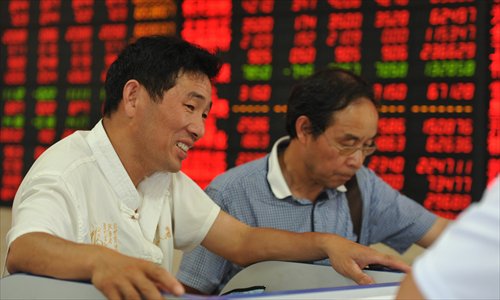Stock market rebounds after policy boost
Rise above 5,000 points unlikely in short term: analyst

Investors check stock information at a brokerage in Fuyang, East China's Anhui Province. Photo: CFP
China's stock market bounced back on Tuesday following the release of various support measures, with the benchmark Shanghai Composite Index rising by 5.53 percent to close at 4,277.22 points.
The Tuesday rebound came after a drop of 3.34 percent on Monday and a slump of 7.38 percent on Friday.
The Shenzhen Component Index also recovered on Tuesday, closing up 5.69 percent at 14,337.97 points.
The ChiNext Index, which tracks China's NASDAQ-style board for growth enterprises, rose by 6.28 percent to close at 2,858.61 points on Tuesday.
Financial stocks saw the biggest rise on Tuesday, with the insurance sector jumping by 6 percent, while banking and securities stocks rose by around 5 percent on average.
Investors and analysts said that favorable policies announced by the government during the past few days were the major factor behind the rebound on Tuesday.
The central bank announced a cut in interest rates and banks' reserve requirement ratio on Saturday, which was seen as a positive sign for the stock market.
Zhang Xiaojun, a spokesman for the China Securities Regulatory Commission (CSRC), said late on Monday that the market drop was merely an "adjustment" following the previous bull run. He also noted that too big a drop may hurt the development of the stock market, indicating the government's desire to stabilize the market, analysts said.
Besides, the Ministry of Finance and the Ministry of Human Resources and Social Security (MHRSS) jointly released draft rules late on Monday for pension funds to be invested in the stock market.
The draft rules restrict the maximum proportion of investments in stocks and equities to 30 percent of total net assets, according to a statement from the MHRSS.
Analysts said that pension funds worth over 1 trillion yuan ($161.3 billion) are expected to become available for investment in stocks and equities, as total pension funds reached 3.56 trillion yuan as of the end of 2014, according to data from the MHRSS in May.
Li Zhong, a spokesman for the MHRSS, told the media Tuesday that the new move on pension funds may have some positive impact on the stock market but it is unlikely that any major boost will happen in the short term.
Li said that absolute safety must be guaranteed for pension fund investments, Xinhua News Agency reported Tuesday. "The funding is used for retirees' daily lives and it cannot be jeopardized by big risks," Li was quoted as saying.
An analyst at China Galaxy Securities Co surnamed Wang said that the rebound on Tuesday was a market readjustment, rather than a response to the recent favorable policies.
"There is usually a rebound after big drops," Wang told the Global Times Tuesday.
Wang also noted that the market should not overestimate the stimulus effect from pension fund investment, as the funds will avoid high-risk stocks.
Some analysts attributed the volatility in the A-share market to recent efforts by the securities authority to tighten controls on margin trading.
The China Securities Regulatory Commission announced in April that it would impose stricter regulations on margin trading and that it had required securities firms to strengthen checks on possible margin trading irregularities.
Meanwhile, media reports on Tuesday said that the government is considering cutting stamp tax for stocks, which could offer another boost for the market.
Also, Central Huijin Investment Ltd, a unit of the country's sovereign wealth fund, reportedly invested 10 billion yuan in the stock market on Monday, another sign that the government is trying to stabilize the market.
Wang noted that there is room for a further rise but the market is unlikely to go above 5,000 points, partly because of the curbs on margin trading.